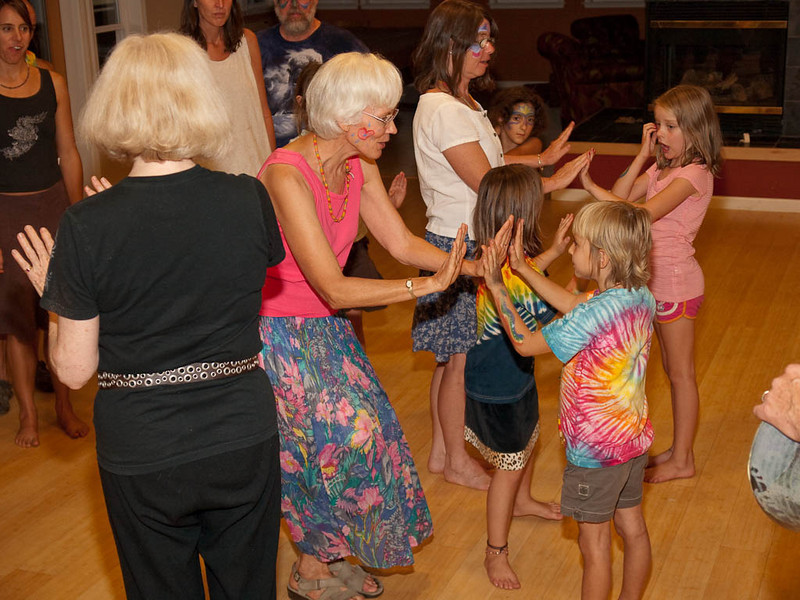Kids and Seniors make great community

For most families it is easy to imagine the benefits of sharing a cohousing community with other families with kids the same age. Naturally the kids will play together, the parents will have peers moving through the same stages together, and carpooling to activities is likely.
I want to take a moment to write about the benefits for a family sharing community with people who do not have young children. Like so many things about cohousing, it can be hard to imagine multi-age community because it is so far outside our life experience, even though it was very much a part of life for most of human history. From daycare centers to schools to churches, our current norm is to separate children into same age groups and we tend to maintain those divisions throughout life.
Cohousing is much more like the villages of old where children not only played with children of all ages, they played and worked and learned with adults of all ages as well. The reality of forming cohousing communities is that many begin with seniors who have the ready resources of time and money required for the huge project that is creating a community from scratch. Many of these groups envision sharing their older years with neighbor children and one of the biggest challenges is to attract those young families to a group that has more grey hair than any other color, for now.
So why would a young family choose to be the first family to buy into a cohousing community? Because it is a myth that “making friends requires being around people like me.” One of my favorite cohousing stories is of a young child who said to his parents, “I’m going over to play with my friend Bill.” Bill was in his 70s, and he wasn’t babysitting. The structures of community were more than enough to bridge the 7 decades of age difference and support an authentic friendship between two different people.
Here are my top 5 reasons to move into cohousing with kids, even if there aren’t other kids in the community yet.
Confidence – Cohousing kids grow up talking to people of all ages, not only in 30-second, “aren’t you cute?” sort of greetings, but in an “I see you as a whole person and I want to know you better and better.” reciprocal relationship of humanity. The message our society sends to children that they are “less than” or in some way both entitled and needy, which tends to transfer to relationships with college professors and bosses and anyone of authority. In cohousing, that message is replaced by a message of value and responsibility. Cohousing kids are full members of community with daily practice engaging in all kinds of conversations, which is exactly the experience that creates authentic confidence.
Self-worth – For centuries children have developed their sense of self worth by contributing to their communities in meaningful ways. Opportunities to do that have become more and more rare. In cohousing whether it is setting the table for a common meal or leading the team that cooks that meal or walking a dog for a sick neighbor, opportunities to joyfully and meaningfully contribute to building community abound. As an added bonus, odds are they will be offered paid work by neighbors who need pet care or physical labor.
This is even more likely if there are a lot more seniors than children in community. My daughter had a 3-figure monthly income by the time she was 12 doing work she really loved. These contributions, appreciated by neighbors, generate self-worth, which is a better predictor of success than education, intelligence or wealth.
Learning – Whatever your child is ready to learn next, odds are there is someone in the community willing to teach or interested in learning alongside. If that person happens to be retired, they will have the time to do it too. That’s handy because most learning is much easier to do with another person and most parents are short on both skills and time to keep up with the dreams and interests of today’s kids.
Support – From time to time kids crash and burn. Whether that is a bike accident, a tangle with a friend or a frustration that makes them want to run away from home, in community odds are they will find a listening ear, a place to land and some help fixing that bike. With neighbors close at hand, who know their young neighbors well, there is plenty of support when it is needed.
Joy – for your family and your soon-to-be neighbors. Nature’s symbiosis allows the youngest and oldest among us to effortlessly bring joy to one another. Neighbor to neighbor, nurtured by the safe space of community, joy spreads and fills the space between the challenges becoming the more memorable experience of community life. The first clear memory I have of the community I call home happened before I lived there. A stranger to these people who would become my neighbors, I was passing in front of the common house when a four-year old bundle of energy presented herself in front of me. “Are you coming to my birthday party?!?” she asked, never hesitating to offer welcome, thoroughly caught in the joy of a party surrounded by community.
Yes, opportunity for groups of children to play together is a great benefit of many cohousing communities, but it isn’t the only reason to join one. Don’t let the (probably temporary) absence of other kids prevent your family from enjoying all the benefits cohousing has to offer.
Category: Kids & Teens
Tags: Children, Connecting, Diversity, living in cohousing
Views: 1843

